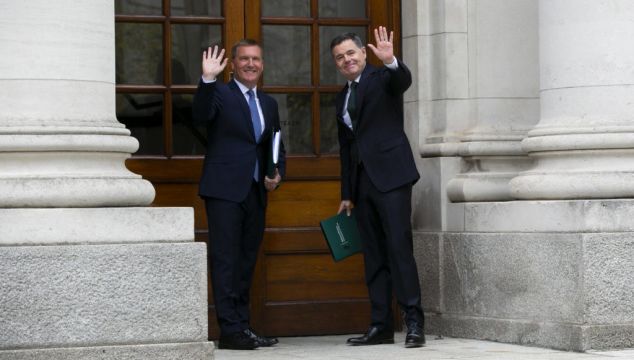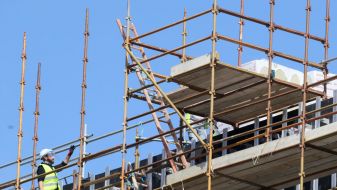Budget 2023 has been unveiled by Minister for Finance Paschal Donohoe and Minister for Public Expenditure Michael McGrath.
Here are the main points from next year's budget:
- The €11 billion budget includes a €4.1 billion package tackle cost of living and €6.9 billion for core budget measures
- Electricity credit of €600 for all households to be paid in three instalments
- Excise duty reduction for fuel and marked oil/gas, as well as reduced VAT rate of 9 per cent for energy, to be extended to February 28th, 2023
- Weekly social welfare rate to increase by €12
- Fuel Allowance will be increased and scheme will be expanded to increase eligibility
- Excise duty on a 20-pack of cigarettes to increase by 50c, with pro rata increases for other tobacco products
- Income tax band for lower rate to be increased to €40,000
- Zero VAT rate to be applied to hormone replacement, nicotine replacement and period products
- Vacant property tax to be applied to residential properties occupied for less than 30 days in a 12-month period
- Help to Buy scheme extended until the end of 2024
- Rent tax credit worth €500 per year
- 25 per cent reduction in childcare fees
- Funding to provide free school books to all primary school children
- Removal of hospital inpatient charges for all
- Free GP care for people on or below the median income
- Free contraception to be extended to all women aged 16-30 and funding will be rolled out for IVF treatments
#Budget2023 is all about reducing the bills that people and businesses have to pay.
Tánaiste @LeoVaradkar explains 10 key ways how this year’s Budget will help business and workers 👇 pic.twitter.com/4AHnyf5r8C— Department of Enterprise, Trade and Employment (@DeptEnterprise) September 27, 2022
The €11 billion budget announced in the Dáil on Tuesday includes a €4.1 billion cost-of-living package, in addition to €6.9 billion for core budget measures.
Underlining the challenges facing the Irish economy, including the war in Ukraine and Brexit, Mr Donohoe said it was "imperative" that the State prepare for potential shocks, apportioning €2 billion to the Rainy Day fund for 2022, to be followed with a further €4 billion next year.
Outlining the economy's headline figures, the Minister for Finance added that his department has revised the rate of core inflation to 5.25 per cent for 2023 and 4.5 per cent for 2024.
He added the pace at which the economy is growing will likely slow for the remainder of the year, revising down the figure for modified domestic demand to 1.25 per cent for 2024.
Cost of living
The energy credit will be paid to all households in three instalments, the first of which will come before Christmas while the remaining payments will be made in early 2023.
Businesses will also be supported in paying their energy bills, up to €10,000 per month, based on average unit prices from 2021 and 2022.
📱𝗬𝗢𝗨𝗥 𝗚𝗨𝗜𝗗𝗘 𝗧𝗢 #Budget2023
Struggling to keep up with everything from #Budget2023🤔
A simple and easy-to-follow guide has now been published👉 https://t.co/ZtVBgvA8lK pic.twitter.com/eAMA20T845— MerrionStreet.ie (@merrionstreet) September 27, 2022
Advertisement
The Carbon Tax has been increased, however, the price of fuel will not increase at the pumps as the increase will be offset with the national oil reserve levy.
Excise duty on fuel will remain unchanged at 21c per litre for petrol, 16c per litre for diesel and 5.4c per litre for marked gas/oil, while the reduced VAT rate for energy of 9 per cent will remain until February 28th, 2023.
Social Welfare
Weekly social welfare rates will increase by €12, while a double payment will be paid in October.
A double payment of child benefit will also be rolled out, while people living along will receive a once-off €200 payment before Christmas.
The Christmas Bonus will also be paid this year, while those in receipt of the Working Family Payment, Cost of Disability Payment will receive a €500 once-off payment.
Carers are also in line for a once-off €500 payment, while eligibility for the Fuel Allowance will be expanded coming into the winter.
Miss the Ministers' speeches❓
You can now read both in full📱
Minister @Paschald 👉 https://t.co/ksxTeVLLu5
Minister @mmcgrathtd 👉 https://t.co/Z91BkfWXvn pic.twitter.com/VZutsfnMuK— MerrionStreet.ie (@merrionstreet) September 27, 2022
Taxation
There were major changes announced for taxation, the most notable being the expansion of the lower rate band for income tax.
Income up to €40,000 will now be taxed at the lower rate (20 per cent), up from the previous €36,800 threshold.
Excise duty has been increase by 50c on a 20-pack of cigarettes, and will be charged on a pro rata basis on other tobacco products. Those looking to quit smoking will benefit from the new zero per cent VAT rate announced for nicotine replacement products, with the measure also covering hormone replacement and period products.
A zero VAT rate will also apply to newspapers, while the reduced VAT rate for the hospitality industry of 9 per cent will be wound down in February.
Personal, employee and earned-income tax credit to increase by €75, while the carer tax credit will increase by €100.
Housing
Highlighted as a major area the Government wishes to focus on, Budget 2023 includes €6.2 billion for the Department of House, €2.5 billion of which will be capital investment.
Hoping to increase housing stock by reducing the number of vacant properties in the State, the Government will introduce a vacant property tax for properties occupied for less than 30 days in 12-month period. The tax will be charged at a rate of three times the property's existing local property tax.
In welcome news for first-time buyers, the Help to Buy scheme has been extended, at current rates, until the end of 2024.
Meanwhile, included in the cost-of-living measures, renters will receive an annual tax credit of €500, which will also be claimable for rent paid in 2022.
🟢 A 25% cut in childcare fees
🟢 Energy supports for businesses & households
🟢 Retaining historic cuts to public transport fares
🟢 Maintaining unprecedented supports for the arts
Ministers @rodericogorman, @cathmartingreen and @EamonRyan on the #TheGreenEffect in #Budget2023. pic.twitter.com/3soMU2Xy13— Green Party Ireland (@greenparty_ie) September 27, 2022
To meet housing commitments laid out in the House For All plan, the Government will provide funding to deliver 9,100 new-build social homes, 5,500 new affordable homes for sale and rent, and 6,500 new social homes.
Retrofitting also featured in the housing budget allocation, with €87 million to be provided for retrofitting next year, in addition to a new low-cost loan for those undertaking residential retrofits.
For the building industry, a levy will be charged on concrete products, including concrete block and pouring concrete, which the Coalition project will raise €80 million annually. The money will be used to cover the cost of the Mica Redress Scheme and will take effect from April 3rd next year.
Education and childcare
The student contribution for third-level education will be reduced by €1,000 for the 2022/2023 academic year, before a permanent reduction of €500 takes effect for households earning between €62,000-€100,000 next year.
For students in receipt of the SUSI grant, a once-off double payment will be made this year, while rates will increase by between 10-14 per cent from next September.
College reg fee reduced by 1k for this year
Permanent reduction of between €500-1500 next year for households below 100K income
Double student grant payment before Christmas & monthly rises from January
Extra €1000 post grad grant
Apprenticeship reg fees reduced #Budget23 pic.twitter.com/7EREpJhGsk— Simon Harris TD (@SimonHarrisTD) September 27, 2022
The Department of Education has secured funding to provide free school books to all primary school students from next year, as well as funding for 370 additional teaching posts, 686 extra teachers to support students with special needs, and 1,193 more SNAs.
Childcare fees will be reduced by 25 per cent.
Health
The Department of Health has received €23.4 billion as part of the budget, with the abolition of inpatient hospital charges among the most notable measures.
Free GP care will also be extended to over 400,000 people, being offered to those earning up to the State's median income.
Budget 2023 continues cutting costs in healthcare in Ireland - reducing costs for patients and making healthcare more affordable.
Some of the measures include abolishing hospital charges, expansion of GP visit cards and access to IVF. pic.twitter.com/kmDVMAt7Fb— Fianna Fáil (@fiannafailparty) September 27, 2022
The Drug Payment Scheme threshold will remain at the lower rate of €80 for 2023, while the free contraceptive initiative will be expanded from the current 18-25 range to include those aged 16-30.
Funding will also be provided to help people access IVF treatment, while €58 million has been allocated for mental health services.
The ongoing response to Covid-19 received €439 million, while the budget also included funding to deliver 650 acute and community beds by end of 2023, as well as the recruitment of 6,000 additional healthcare staff.







